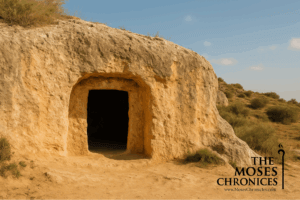
We do not just bury our elders. We carry them—through memory, through blessing, through the soil that welcomes them home. And in that sacred act, we remember who we are.
Buried With Honor: What Jacob’s Funeral Teaches Us About Grief, Memory, and African Ancestry
Jacob’s final breath was not a moment of silence. It was a call to remembrance. In The Moses Chronicles: Prelude, his death sets in motion one of the most poignant scenes in the book—a journey that speaks not just to ancient Israel, but to African homes where grief is sacred, and burial is a return to origin.
The Death of a Patriarch, the Weight of a Nation
He was mourned for seventy days. Not just by his sons, but by Egyptian officials, captains of trade, and priests of foreign gods. Yet they all stood still when Jacob died. Because grief—real grief—respects legacy even when it doesn’t share blood.
In many Kenyan cultures, we still pause. We still carry the old ones to their rest with stories, songs, tears, and days of gathering. We understand that when an elder dies, it is not only the body that is buried—it is prophecy, unfinished prayers, and the names of those who came before.
The March to Machpelah
Joseph did not bury his father in Egypt. He carried him across borders—through dry plains and memory—back to the cave where Abraham slept, where Isaac and Rebekah waited, where Leah still rested.
This was not a simple act of burial. It was a reclaiming. A homegoing. And Joseph did not go alone. His brothers walked beside him. Egyptian warriors guarded the procession. Hebrew mothers wept behind veils. Even Pharaoh’s court bowed to honor a man whose God they did not serve.
A Scene to Remember
“We made it, Abba,” Joseph whispered at the cave’s edge. “I brought you home.”
The brothers stood in silence as Jacob’s body was lowered. No one argued. No one demanded. Dust met dust. Promise met place. And for a moment, the pain that had broken them became the love that covered them.
Grief Is a Map to Memory
In Kenya, we know what it means to mourn well. To wash the body. To name the ancestors. To call the children to witness. Jacob’s burial in Prelude offers that same rhythm. It does not rush. It does not sanitize sorrow. It lets the family feel everything—and then walk forward with honor.
We do not always grieve the same. Some sit in silence. Others wail. But we all carry the same hope—that our mourning is not wasted. That the ones who sleep do not disappear. They become story. They become strength. They become the path beneath our feet.
Legacy Is Planted, Not Preserved
Jacob’s last gift was not gold or land. It was prophecy. Words spoken over sons who did not always deserve them. A hand resting on Ephraim’s head. A double portion given to Joseph. A name remembered through Dinah’s voice.
We don’t bury ancestors to forget them. We bury them to lift the ones they left behind. To remind the living what it means to belong to a name, to a promise, to a God who does not forget.
📖 Download 7 Free Chapters (No Sign-Up Needed)
We’re offering seven chapters—three from Prelude, four from Hands That Rock the Cradle—so you can begin the journey yourself.
✅ Witness a biblical funeral that honors grief, ancestry, and promise
✅ Read how burial becomes a spiritual reclaiming of land and legacy
✅ See how biblical fiction can restore memory for African readers
📩 Click here to download your free sample
Learn more about: Prelude or Hands that Rock the Cradle
International Readers: We’ve made paying in your local currency easy:
KENYA |
PHILIPPINES |
SOUTH AFRICA |
NIGERIA
About the Author
RR Wekesa is a Christian historical fiction author writing faith-rich novels that follow the ancient paths of Scripture, weaving sacred silence and poetic rhythm into every chapter of The Moses Chronicles.
